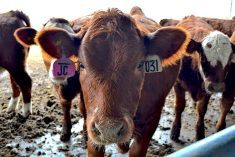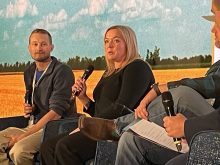Dairy farmers won 280 million euros (C$430 million) of additional subsidies from the European Union last Monday after weeks of protests over low milk prices.
But some of the farmers, who burned hay, threw firecrackers and blocked traffic with tractors and buses as EU farm ministers met in Luxembourg, said only a regulatory reform of the sector would provide a long-term solution to their problems.
Announcing the additional aid, which will be distributed among member states in 2010, EU Agriculture Commissioner Mariann Fischer Boel said she hoped for a quick end to the protests.
Read Also

Alberta boosts investment in wetland restoration
The province plans to add 67 hectares of new wetlands to strengthen natural flood and drought defences and improve water quality.
“This is my contribution and also the contribution of the (European) Commission to try to put an end to some of these protests in the streets. I think this has to stop,” Fischer Boel told reporters.
The farm ministers from the 27-country bloc also discussed proposals by 21 member states led by France and Germany, including prolonging public intervention in the dairy market.
“We hope that we can stabilize the market with the proposals that we have today,” said Swedish farm minister Eskil Erlandsson, whose country holds the EU presidency until the end of this year.
But the proposals failed to douse a protest by about 2,000 farmers near the ministers’ meeting, causing traffic chaos which prompted EU finance ministers to change the venue of talks they planned in Luxembourg later on Monday.
“Fair Trade, Fair Bananas, Fair Coffee, Where is our Fair Milk?” one banner read. Another declared: “1 litre Cola = 5 litre milk, is that fair?”
The dairy farmers have been protesting for weeks and began a two-week milk supply boycott across Europe last month.
They blame EU liberalisation policies for falling prices and are demanding milk surpluses be removed from the market in the short term. They also want a pan-European institution created to regulate the dairy market.
“This decision is not what we wanted. Our proposal is for a regulation of the dairy market and reduction of milk quotas by five per cent,” said Rogier Florent, a dairy farmer from France.














